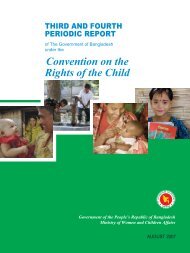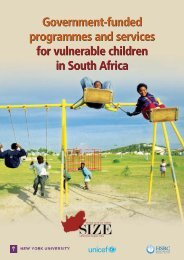Age assessment practices: a literature review & annotated ... - Unicef
Age assessment practices: a literature review & annotated ... - Unicef
Age assessment practices: a literature review & annotated ... - Unicef
You also want an ePaper? Increase the reach of your titles
YUMPU automatically turns print PDFs into web optimized ePapers that Google loves.
police officers (see for example, Kamara 2008; European Migration Network, 2010). In the<br />
juvenile justice system, it is common for judges to exercise full discretion in ascertaining<br />
children‟s ages, without any clear guidelines at all There are widespread reports from<br />
Bangladesh, Nepal and Pakistan that police officers and prosecutors often exaggerate<br />
children‟s ages in court documents, usually to avoid having to implement the additional<br />
safeguarding procedures granted to children by law, but also to boost arrest and prosecution<br />
rates. Magistrates very often then accept without question the ages reported by officers and<br />
prosecutors, and children often lack the legal representation necessary to challenge the<br />
falsified ages (Cipriani, 1995:14). Even when specific guidance is available, there is<br />
evidence that it is not always implemented in practice as will be discussed below.<br />
Procedures to make official estimates of age have often proven to be impractical. For<br />
example, medical examinations are required in many countries but the lack of detailed<br />
knowledge and resources, and the limited availability of doctors mean that significant delays<br />
are brought to cases. Overloaded judges do not take the time to examine evidence which is<br />
available, such as school records or to question witnesses to ascertain children‟s true ages,<br />
and very often they ignore the required procedures altogether. If there is still some question<br />
over a child‟s age by the time his or her case reaches a judge‟s attention, such as in<br />
Bangladesh, judges may simply guess the child‟s age by appearance (Cirpriani, 1995:13).<br />
In Sierra Leone, the Children and Young Persons Act makes provisions for courts to make<br />
inquiries to ascertain the age of a person before them. However, the Act falls short of<br />
stating how such an inquiry should be conducted. It has become practice to seek the advice<br />
of a medical practitioner, but given that there is only one doctor charged with the<br />
responsibility of determining age, and a limited number of staff available to type up the<br />
results, significant delays and adjournments to court proceedings result, and the children are<br />
kept in detention during this time (Kamara, 2008:3). Cirpriani (2009:133) describes how this<br />
„happens all too frequently‟, as courts in countries including Oman, Ethiopia and Sri Lanka,<br />
request age <strong>assessment</strong>s by medical professionals who are not readily available, resulting<br />
in children being detained in locked pre-trial facilities.<br />
The costs associated with medical <strong>assessment</strong>s cannot be underestimated. Cipriani states<br />
that wrist x-rays may cost between 60 and 85 Euros, while dental examinations can cost<br />
approximately 90 Euros. Between the need for highly trained professionals and these<br />
immediate costs, such examinations would not seem to be financially practicable in most<br />
countries (2009:134), and both Bulgaria and the Czech Republic discount these methods for<br />
this reason (European Migration Network 2010; Separated Children in Europe Programme,<br />
2003).<br />
The slow process of determining age impacts on all aspects of juvenile proceedings, and<br />
undermines the very aim of the juvenile justice system to reform and rehabilitate the<br />
juvenile, and promote their reintegration into society. However, Kamara (2008) describes<br />
how in Sierra Leone, while the age of a juvenile remains in dispute, they will remain in<br />
detention in an adult prison. The process has also led to prolonged trials, undermining the<br />
principle of expeditious trials.<br />
29
















